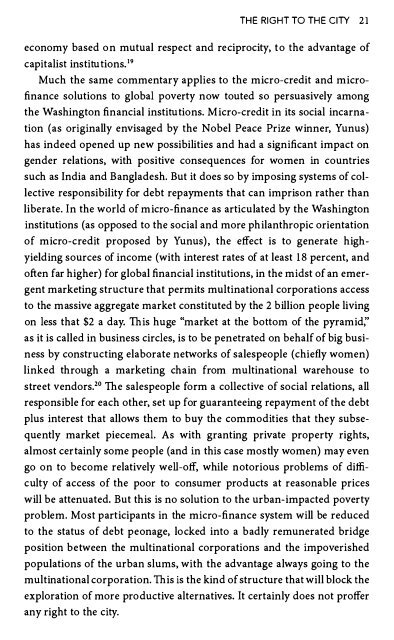Rebel Cities-David Harvey
Rebel Cities-David Harvey
Rebel Cities-David Harvey
- No tags were found...
You also want an ePaper? Increase the reach of your titles
YUMPU automatically turns print PDFs into web optimized ePapers that Google loves.
THE RIGHT TO THE CITY 21economy based on mutual respect and reciprocity, to the advantage ofcapitalist institu tions.19Much the same commentary applies to the micro-credit and microfinancesolutions to global poverty now touted so persuasively amongthe Washington financial institutions. Micro-credit in its social incarnation(as originally envisaged by the Nobel Peace Prize winner, Yunus)has indeed opened up new possibilities and had a significant impact ongender relations, with positive consequences for women in countriessuch as India and Bangladesh. But it does so by imposing systems of collectiveresponsibility for debt repayments that can imprison rather thanliberate. In the world of micro-finance as articulated by the Washingtoninstitutions (as opposed to the social and more philanthropic orientationof micro-credit proposed by Yunus), the effect is to generate highyieldingsources of income (with interest rates of at least 18 percent, andoften far higher) for global financial institutions, in the midst of an emergentmarketing structure that permits multinational corporations accessto the massive aggregate market constituted by the 2 billion people livingon less that $2 a day. This huge "market at the bottom of the pyramid;'as it is called in business circles, is to be penetrated on behalf of big businessby constructing elaborate networks of salespeople (chiefly women)linked through a marketing chain from multinational warehouse tostreet vendors.20 The salespeople form a collective of social relations, allresponsible for each other, set up for guaranteeing repayment of the debtplus interest that allows them to buy the commodities that they subsequentlymarket piecemeal. As with granting private property rights,almost certainly some people (and in this case mostly women) may evengo on to become relatively well-off, while notorious problems of difficultyof access of the poor to consumer products at reasonable priceswill be attenuated. But this is no solution to the urban-impacted povertyproblem. Most participants in the micro-finance system will be reducedto the status of debt peonage, locked into a badly remunerated bridgeposition between the multinational corporations and the impoverishedpopulations of the urban slums, with the advantage always going to themultinational corporation. This is the kind of structure that will block theexploration of more productive alternatives. It certainly does not profferany right to the city.


